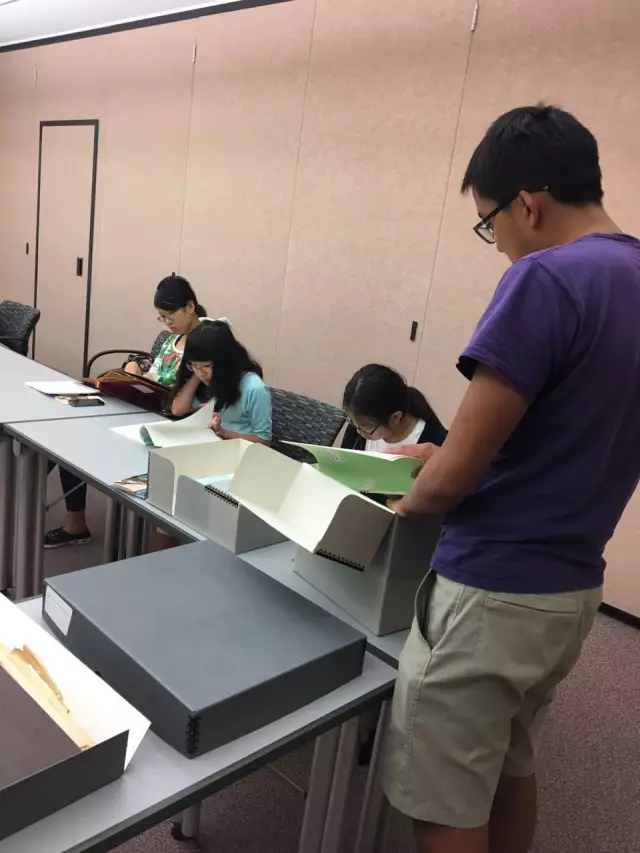

美國華人維權聯盟青少年寫作組成員瀏覽圖書館移民史料
七月十三日下午,美國華人維權聯盟青少年寫作組的六名學生在陳垚和張鶯帶領下,參觀了明州大學圖書館移民檔案室。陳垚在明州大學圖書館東亞館任職,張鶯是生物信息系統研究員。她們為大家爭取到了參觀學習的機會。此次參觀後,青少年作者將深入了解並記載不同職業華人的移民心路歷程。
參觀當日,青少年作者們聽取圖書館員 Mr. Ratsabout 介紹應用多媒體述說歷史。之後 Ms. Hoehn 講述怎樣記載口述歷史,並拿出大量歷史檔案資料及圖片供大家閱覽。兩個館員講得認真,青少年作者們聽得投入、踴躍提問、參與討論。
青少年作者不僅學到了採訪寫作的技巧,同時也了解到美國不同民族,尤其是我們先輩美籍華人的移民史。豐富的圖片再現了在美國多元化民族共存的歷史中,華人漫長艱辛的移民路。每一個人對古老而偉大的土地上生命的繁衍生息肅然起敬。


明州大學圖書館移民檔案室史料
無數的普通美國人敘述並記載自己家庭的移民史。每個人物的故事徐徐展開,以個人的命運起伏啟發大家的共鳴。其間,還播放了圖書館收藏的一段小視頻(http://youtu.be/wfcYY6nk_Ko),一個第七代美國華人後裔口述祖輩的移民之路(附觀後感)。歷史就是這樣敘述着昨天的故事,悠遠綿長。
美國華人維權聯盟是今年四月在明州及IRS註冊的非營利組織 (The Association of Chinese Americans For Social Justice) 。我們堅持華人黨理念(http://mp.weixin.qq.com/s/B-O74Bq8_NuvVttBjENdDA;http://mp.weixin.qq.com/s/gkDgV8gcUANnlX6XXmkfLw)。
華人黨不是專業的政治組織,是着重於喚醒同胞血濃於水的親情意識。"黨"當名詞是親族、集團、鄉親;當動詞有偏私和偏袒的意思。其實還表示美、善、或者正直。多麼美妙的自稱:同族之人,心存善良、正直、維護自己利益。政治應該是每個人的”副業”,我們華人要通過自我教育,擺脫政治迷茫 ,成為精明的公民,思考公民美德、意識和權利。我們鼓勵華人參與公共政治,注重提高華人參政素質,加強公民道德和權利教育。我們的工作避免一蹴而就,而是腳踏實地為華人服務。
歷史寫作是我們的重點項目。得不到真實的歷史知識和信息會令我們麻木、迷茫和愚昧。歷史寫作的目標是回顧歷史、教育同胞、警醒後人、思考未來。我們收集整理過往200年華人先輩們經歷的一些標誌性事件的史料,從中選取十幾個專題,以專業的文筆將之發展成一個個豐滿、完整、立體的故事,以此來贏得全美五百萬華人,乃至中國十三億華人的廣泛關注。美國華人維權聯盟是項目發起人,我們也在尋找不同領域的機構合作成為這個項目的共同發起人。
青少年寫作是我們美國華人維權聯盟歷史寫作的一個相關項目。關注族群利益從下一代做起,希望華裔下一代有更多人因為內心的志向和人格訓練而成為公共政治領域中的治世之才。不論從事高尚的政治事業或以政治為”副業“,都心甘情願地付出,出於責任感和權利意識而推動華人族群利益。千里之行始於足下。讓我們攜手共同書寫屬於我們今天和明天的美國華人歷史!
contact us:
chineseforsocialjustice@gmail.com
https://www.facebook.com/groups/310911239328698/
歡迎掃一掃下面二維碼參與討論:

On May 6th, 1882, President Chester signed H.R. 5804, formally enacting the Chinese Exclusion Act. It was the first law in the history of the United States that banned immigration from a specific ethnic group into the country.
At the time, the ban was extremely popular. “Chinamen” were seen as undesirable people: aliens with strange appearances and customs compared to a mostly white, Christian nation. Unions, such as the Knights of Labor, believed Chinese immigrants were stealing jobs and lowering wages. Politicians claimed that Chinese miners and workers posed a “security threat” towards American culture and ideals.
For a period of 61 years, Chinese immigration to the United States almost completely halted. The only exception to the immigration ban was a familial or working relationship to Chinese merchant or diplomatic officials. Thousands of Chinese immigrants adopted new names, family histories, and relationships in an attempt to circumvent the restrictive regulations and procedures.
Those who failed were deported back to China, often losing their life-savings in an attempt to move to America. Those who succeeded had to live a double life, never be able to reunite with their families or start new relationships in the United States.
The Chinese Exclusion Act would not be repealed until 1943, with the passage of the Magnuson Act as a result of World War II. Today, Chinese immigrants do not face the same challenges that their predecessors encountered 100 years prior. The blanket ban has been repealed and the number of Chinese immigrants living in the United States has skyrocketed since the passage of the Immigration and Nationality Act in 1965.
However, this does not mean the problems of the past have completely vanished. Chinese Americans and other immigrants face widespread discrimination and racism across the country. New fears of terrorism and security risks have made an entire religion a target for bigotry and violence. While Chinese Americans no longer have to face obstacles to immigrating to the United States, many other immigrants have to confront new barriers and hurdles. We must take actions to ensure the mistakes of the past are never repeated in the future.
Last week, for the first activity of the Chinese oral history project group, we took an introductory course at the University of Minnesota Library on some basics: what is oral history, and how it has been done. After an hour very interesting class, we had an opportunity to examine many historical documents and artifacts. Immediately, something caught my eye - documents on the Chinese Exclusion Act, which I don’t know much about. While I read through supreme court cases detailing the struggle of Chinese immigrants to halt this trouble law, I found myself stepping into the past.
One of the most striking realizations I had when reading through these cases was the overt racism that permeated through even the highest level of government at the time. Many of the cases showcased an overriding belief that Chinese witnesses, even those who had been living in America for decades, were inherently less reliable than their white counterparts.
In one case, a Chinese merchant who had been living in the US for several years returned to China to see his family. During his return passage, his ship was attacked by pirates, who stole his identification pass (which were required for re-entry due to the Chinese Exclusion Act) that would allow him back into the States. Despite many testimonies by people who lived in his neighborhood that said that he was indeed the man who had departed for China a few months ago, his appeal was denied. Why? Because he failed to produce a white witness who could vet for his identity.
In another case, the Supreme Court asserted that even the unchallenged testimony of Chinese witnesses was not enough to prove the story of another immigrant. In this case, a young Chinese man was taken into custody by officials at Angel Island. He claimed to have been born in the US, a story confirmed by his mother and father, as well as several other witnesses. The prosecution could not produce a single witness to counter these claims. Even so, the Supreme court ruled on an 8-1 decision to deny the man his status as a US citizen.
In reading through these cases, I feel grateful for the progress that has been made, the stereotypes lessened, and those brave souls who had the courage to stand up to oppression and pave a better path for their children and grandchildren. Though they had not succeeded in their own cases, their resistance paved the way for others who would eventually repeal the law. The men and women of these cases leapt out of the pages, and showed me the courage, resilience, and determination needed to change the future for the better.
作者:欣欣然
本文首發於“美國華人”公眾號(ID: ChineseAmericans)
請讀者廣為轉發朋友圈和微信群。其他媒體如要轉載,請聯絡本公眾號。
本文由作者投稿,內容不一定代表“美國華人”微信公眾號立場。
微信公眾號:ChineseAmericans
網站:ChineseAmerican.org
投稿、轉載授權:editor@ChineseAmerican.org





